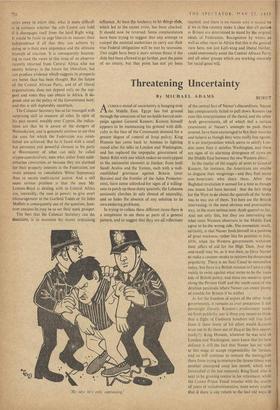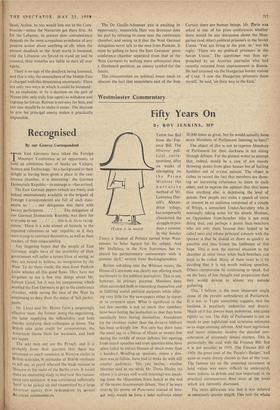Threatening Uncertainty
By MICHAEL ADAMS BEIRUT
A CURIOUS mood of uncertainty is hanging over ..M.the Middle East. Egypt has lost ground through the unsuccess of her no-holds-barred cam- paign against General Kassem; Kassem himself appears to be maintaining his ground with diffi- culty in the face of the Communist demand for a greater degree of control of Iraqi policy; King Hussein has come back to Amman in fighting mood after his talks in London and Washington, and has replaced the unpopular government of Samir Rifai with one which makes no more appeal to the nationalist elements in Jordan; from both Saudi Arabia and the Yemen, each with a well- established grievance against Britain (over Buraimi and the frontier of the Aden Protector- ates), have come unlooked-for signs of a willing- ness to patch up these dusty quaftels; the Lebanon anxiously clutches its safe shroud of neutrality, and so hides the absence of any solution to its own enduring problems.
In trying to collate these different items there is a temptation to see them as parts of a general pattern, and to suggest that they are all reflections of the central fact of Nasser's discomfiture. Nasser has conspicuously failed to pull down Kassem (so runs this interpretation of the facts), and the other Arab governments, all of which feel a certain resentment at Nasser's attempts to push them around, have been encouraged to flex their muscles and behave as though they were really free agents. It is an interpretation which seems to satisfy Lon- don more than it satisfies Washington, and there are signs of an alarming divergence of views on the Middle East between the two Western allies.
In the matter of the supply of arms to General Kassem, for instance, the Americans are unable to disguise their misgivings—and they find many non-Americans who share them. After the Baghdad revolution it seemed for a time as though one lesson had been learned : that the best thing for the West to do about the quarrels of the Arabs was to stay out of them. Yet here are the British intervening, in the most obvious and provocative way, in the most serious inter-Arab quarrel so far. And not only this, but they are intervening on what most Western observers in the Middle East agree to be the wrong side.--The immediate result, certainly, is that Nasser linds. himself in a position of great weakness, rather like his position in July, 1956, when the Western governments withdrew their offers of aid for the High Darn. And the end-result may be, as it was then,,to force Nasser to make a counter-stroke to retrieve his threatened popularity. There is no Suez Canal to nationalise today; but there is a British mission in Cairo trying vainly to swim against what seems to be the main tide of British policy, and there are sensitive spots along the Persian Gulf and the south coast of the Arabian peninsula where Nasser can create plenty of trouble for Britain if he wishes.
As for the freedom of action of the other Arab governments, it remains as ever precarious if not downright illusory. Kassem's predicament needs no fresh publicity, nor is there any reason to think that a flight of Canberra bombers will free him from it (how many of his pilots would Kassem trust not to fly them out of Iraq at the first oppor- tunity?). King Hussein, whatever he was told in London and Washington, must know that his best defence is still the fact that Nasser has no idt at this stage to accept responsibility for Jordan. and so will continue to restrain the nationalists there from trying to overturn the throne (there was another attempted coup last month, which was forestalled at the last moment). King Saud, who is said to be growing restive in his retirement. while the Crown Prince Feisal wrestles with the results of years of maladministration, must surely realise that if there is any return to the bad old wars in
Saudi Arabia, he too would lose out to the Com- munists—unless the Nasserists got there first. As for the Lebanon, its present slow convalescence depends on the most scrupulous avoidance of any positive action about anything at all; when the present deadlock in the Arab world is loosened, and the Lebanese are forced to stand up and be counted, their troubles are liable to,start all over again.
There is no sign of the deadlock being loosened, and that is why the atmosphere of the Middle East is charged with this threatening uncertainty. There are only two ways in which it could be loosened: by an explosion, or by a decision on the part of Nasser (the only truly free agent) to withdraw and regroup his forces. Retreat is not easy for him, and our aim should be to make it easier. The decision to arm his principal enemy makes it practically impossible.







































 Previous page
Previous page